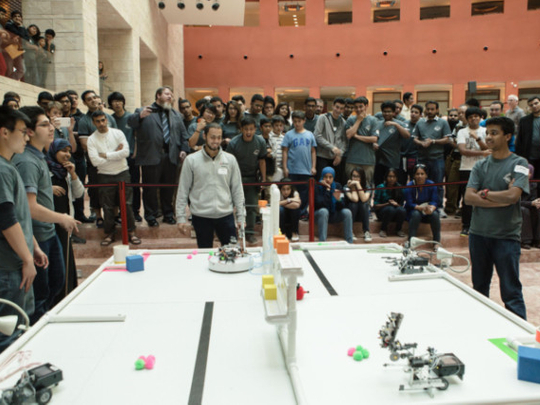
Manama: More than 200 participants from 22 schools across the region have taken part in the 10th annual Botball Educational Robotics Programme, a hands-on learning experience in robotics designed to engage secondary school students in learning the practical applications of science, technology, engineering and maths.
The programme, at Carnegie Mellon University in Qatar, started with four schools participating from Qatar. Botball now has teams from different countries in the region, including the UAE, Kuwait, Egypt, and Libya.
This year’s competition theme was a continuation of last year’s popular Nasa’s Curiosity Rover topic, where students were tasked to build robots that would be able to collect and send samples from Mars back to earth. The theme promotes the idea that robots can work with humans to help them with daily activities.
As part of the competition, a robot called “Botguy” required physical therapy to help re-acclimate to Earth’s gravity. Participants developed experimental autonomous robot technologies to demonstrate various activities needed for Botguy to re-acclimatise and improve his range of motion. The goal was to show students how robotics technologies, physics and mathematical concepts are used to get assistive robots to perform “activities of daily living.”
Students competing have the opportunity to interact with faculty and current students at Carnegie Mellon Qatar giving them insight into what it takes to become a successful Carnegie Mellon Qatar student and learn more about the field of robotics and computer science.
The interaction does not end after the competition and Carnegie Mellon Qatar continues to work with participating schools, equipping them with robotics kits and learning resources, giving them the necessary tools to continue teaching students about robotics. This has led to the formation of robotics clubs in schools, promoting student interest in science, technology, engineering and mathematics fields (Stem).
“When I would go to schools to talk about the Botball programme and robotics I would always ask, what is the first thing that comes to your mind when you think of robotics? Most students have no idea or think of science fiction and Hollywood,”
Mohammad Mustafa, technical adviser of Botball in the Middle East, said.
“With Botball, we try to change their perceptions and explain that robots are everywhere; cruise control on your car, Google, these are all robots. We try to open their eyes at an early age. Year after year we hope Botball’s message will spread throughout the community,” Mustafa said.
The team from DPS-Modern Indian School took home the first place prize: a chance to compete at the International Botball Tournament at the 2014 Global Conference on Educational Robotics (GCER) at the University of Southern California in Los Angeles during July this year. Carnegie Mellon Qatar will continue to work closely with the team giving them advice and feedback on how to improve their robot before they enter the competition.
“The greatest award is the learning experience we have gained, we cannot get this anywhere else. We are so pleased with what we achieved, with the help of Carnegie Mellon and through team work we have taught ourselves robotics in just a few weeks,” said Yogesh Parthasarathy, representing the winning team.
Team members from DPS Modern Indian School included Abhiram Ajith Kumar, Rishikesh Debsot, Rahul Murulidhara Malode, Ajay Menon, Solomon Kingsley Richard. They were mentored by the head of the computer science department, Avishek Jha.
Students began preparing by participating in a workshop in January 2014 led by Mustafa and Damian Dourado, manager of pre-college programmes at Carnegie Mellon Qatar.
The main goal of the workshop was to introduce students to the Botball Programme and the 2014 challenge. Students were taught basic programming, design and building techniques to prepare them for the competition. Once they finished the workshop they had approximately nine weeks to prepare to compete against all the other teams in the Middle Eastern region.
Participating schools included Al Ruya Bilingual School, Al Bayan Bilingual School, Benghazi European School, Hayah International Academy, Indian School Muscat, Yousuf Bin Aissa Secondary School, The British School of Kuwait, Academic Bridge Programme, Al Khor International School, American School of Doha, Doha British School, Doha College, Doha Independent Secondary School, DPS-Modern Indian School, Dukhan English School, Hamza School, International School Of Choueifat, Qatar Academy, Qatar International School and Tariq Bin Ziyad S.I.S.











